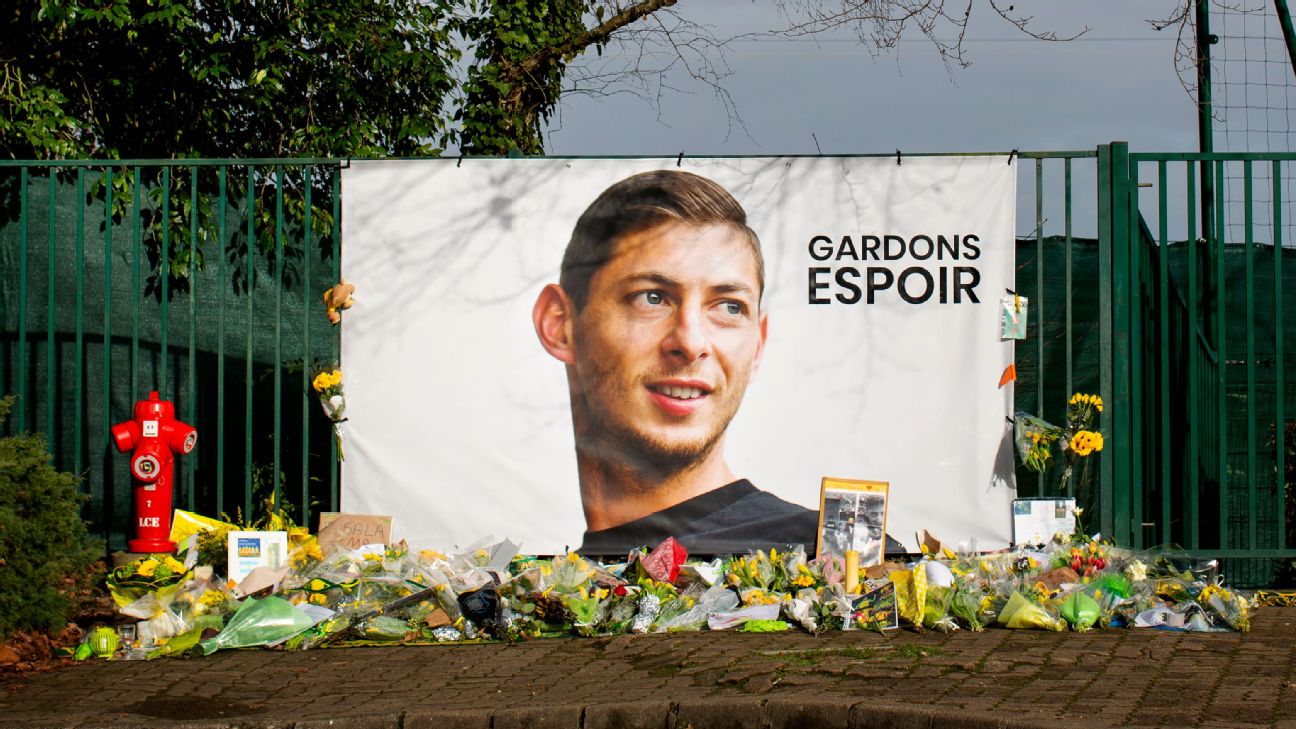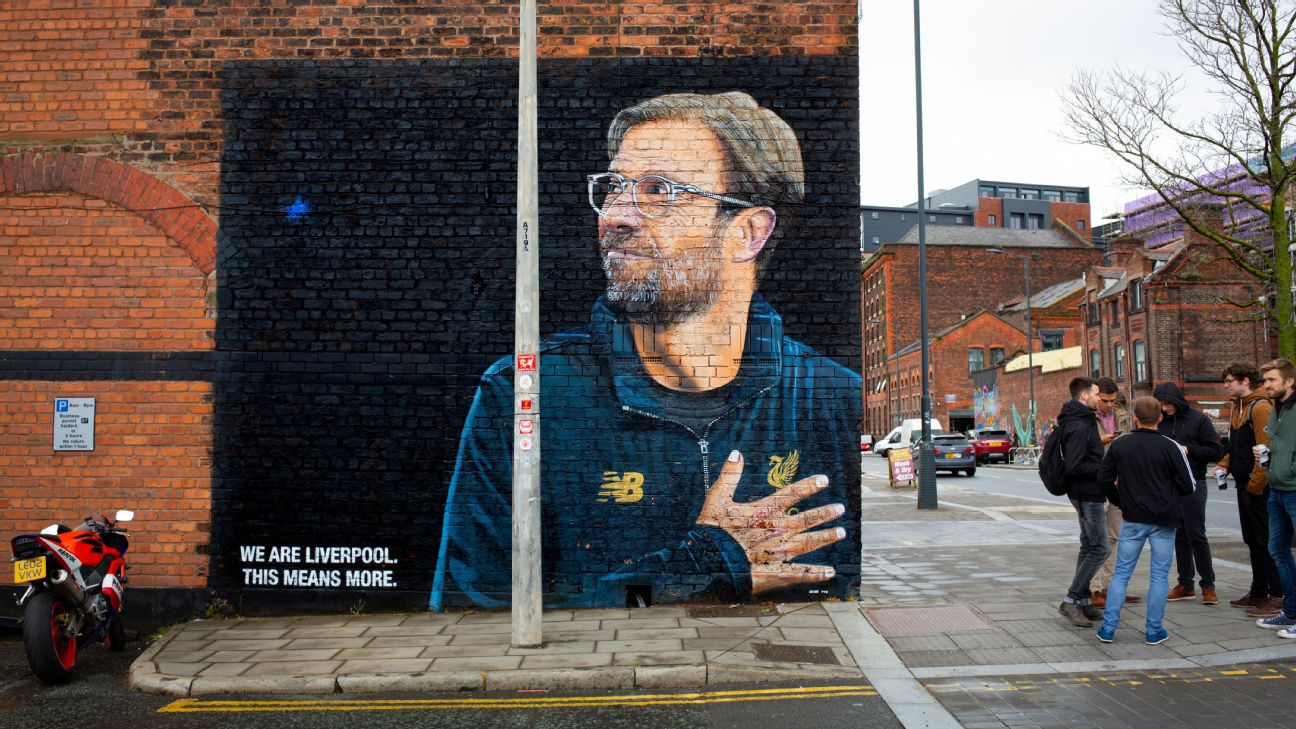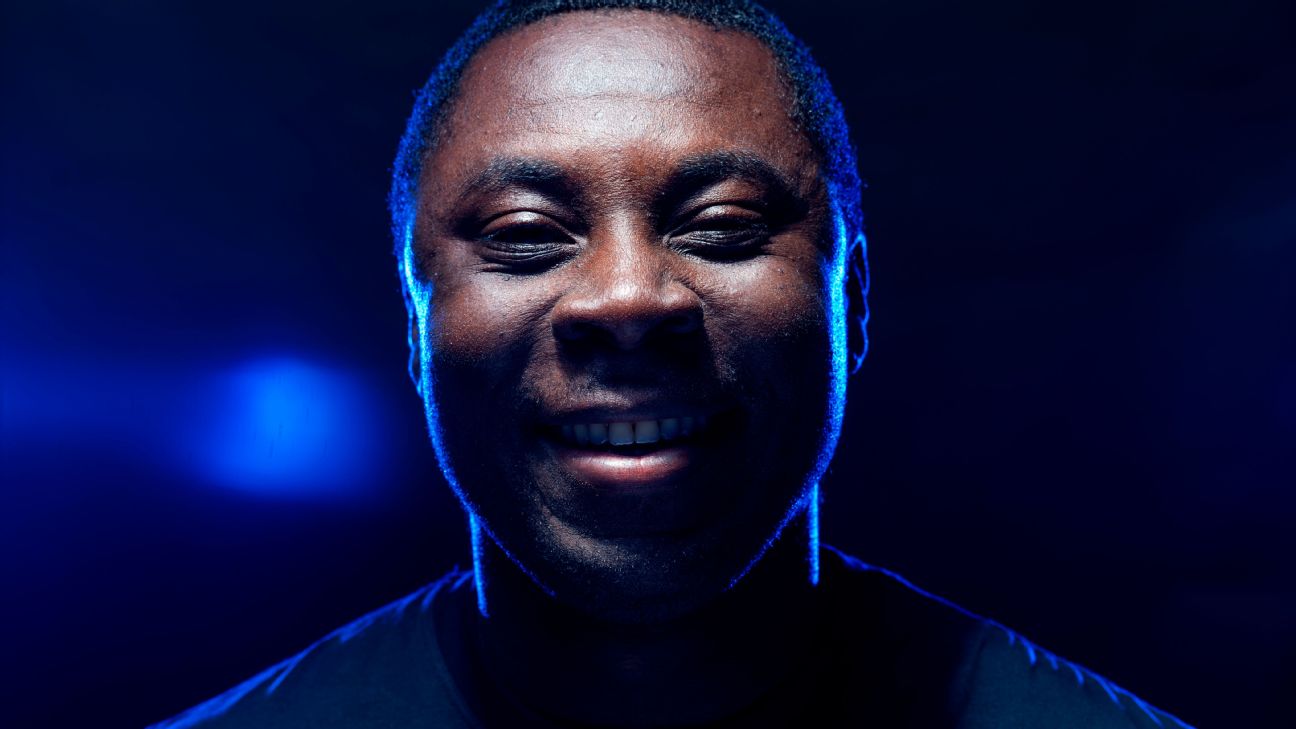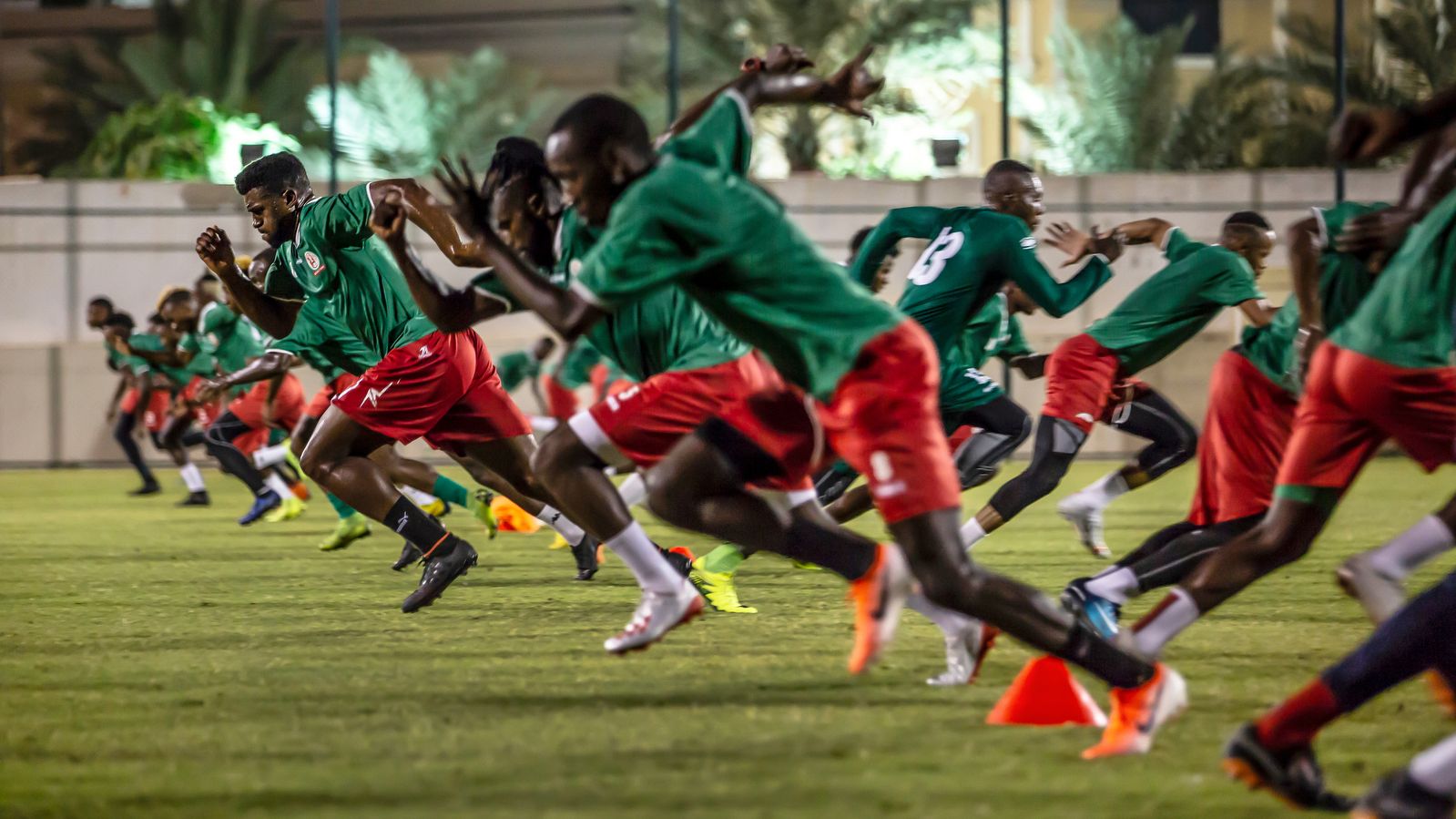
Burundi, the Swallows in War, take flight
They're the lowest-ranked nation at this summer's Africa Cup of Nations (their first), have survived brutal civil war and carry the hope of home with them to Egypt. In a sense, they've already won.
Olivier Niyungeko had tried his best for three years. He had walked around Gällivare, Lapland, in Sweden's bitterly cold far north, clutching a dictionary at first but after a while, he picked up plenty of the local language and had made friends, found work, played regular games of football. But time caught up with him: Niyungeko had declared himself a refugee upon arriving in Sweden, but the paperwork to rubber-stamp his stay had, for reasons unclear, never been approved and the authorities had decided to act.
Along with 16 other Burundians who had set down roots in the country, he was sent back to his troubled homeland. It was February 2010, and he clung to the idea that he could slot straight back in to life as a budding coach, eventually reaching the top and making a difference to the nation he had loved and left. He remembers the reassuring words of a friend in that strange, remote European town, offered shortly before that journey back into the unknown. "Olivier, you are not like the others," she told him. "I know you will be someone, because you love your job." Niyungeko replied: "OK, I love my job. OK, I'll go home. Do not be afraid; you'll see that I am someone."
Now it is June 2019 in Doha, Qatar, where the scorching temperature when training starts could not seem further from Sweden's extremities. "Fika! Fika!" ("Go on! Go on!") are the shouts in Swahili among 28 tired, aching Burundi national team players who have rarely worked harder than this. Niyungeko watches from the side, his towering frame occasionally straying onto the pitch to make a point or offer a correction. Some of the squad tell him that he has been tougher during this camp, more demanding, less tolerant of mistakes. But this is an opportunity everybody has to grasp.
Niyungeko has proved that he is someone but then so have the side he manages: they've achieved what once seemed impossible in taking Burundi to their first Africa Cup of Nations, successfully battling both precedent and the weight of a brutal history.
"Intamba Mu Rugamba" ("The Swallows in the War") are charged with finding a way past Nigeria, Guinea and Madagascar when the group stage begins in Egypt this month but there is something else, too. "We can be an instrument to bring our nation together, to make them proud," says midfielder Gael Bigirimana, one of the more vocal players in that exhausting workout under an early evening sun."We never had an inspiration; for so many kids in Burundi there has been no hope, and you have to have hope."
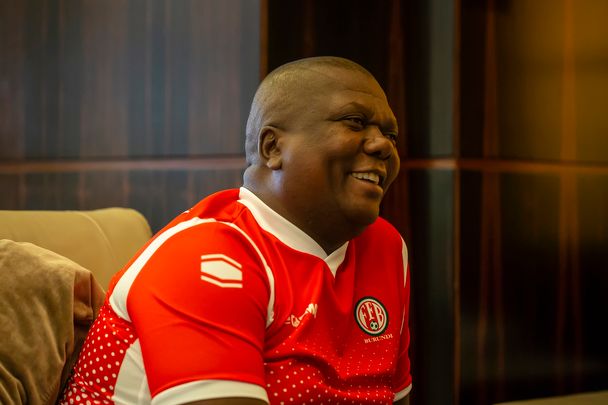
Olivier Niyungeko spent years in Sweden after escaping the conflict in Burundi before returning home in 2010. "Everybody underestimated me, but now we see with the work we've done what we can achieve something." Aparna Jayakumar for ESPN
When the gunshots rang out around Bujumbura, then Burundi's capital, in 1993, Selemani Ndikumana was 6 years old. He remembers seeing people flee from their houses, their belongings hurriedly piled high, in many cases never to return. Years of tension between the Tutsi and Hutu ethnic groups had surfaced just as they had during a series of bloody massacres in previous decades, and the situation was perilous. The country's first multiparty elections had been held that summer but the newly sworn-in Hutu president, Melchior Ndadaye, was assassinated by Tutsi soldiers in October. It precipitated a catastrophic dozen-years civil war that cost an estimated 300,000 lives and displaced huge swathes of the population, many of whom would seek sanctuary all over the world.
Ndikumana is the oldest member of Burundi's squad -- he's their only player over 30, in fact -- and has the clearest recollection of what happened back then. He describes those days as "really, really, really bad" and tells how his father, who was living in Tanzania at the time, sent somebody to urgently transport the family to the neighbouring Democratic Republic of Congo. They would return within weeks under one chilling condition.
"My grandfather told us: 'Hey, you can come back now, no gunshots, just some people stealing from the houses,'" he says. "We didn't want to go back, but at that time the people who were making problems were from the same group as my grandfather so they could not harm him. He was a Tutsi. They would look at the shape of your nose and say, 'You are Tutsi' or 'You are Hutu.' I was able to go back and start a new life, but I was really scared. By day it was OK, but then, after about 5 p.m., the gunshots started again. When I left, there had been gunshots all day, every day. The country became safer: not 100%, but people could work and go to the market. It was not easy." He pauses. "Not easy."
Eventually Ndikumana would leave Burundi again but on his own terms, as a professional footballer. He has played in 11 different countries; it has been a decent career but there is still the tinge of regret that, just when bigger clubs had been attracted by his form as a striker with the Belgian side Lierse, he injured his knee and was sidelined for a year. He has toured plenty of teams in places like Angola, Albania, Sudan and Qatar since then but the national team he has served for 13 years makes up for some of the disappointment.
"It was one of my biggest dreams," he says. "In the past we didn't have a real group. Everybody was minding his own business; it was like we had a good team of names but on the field it was like individuals. That's why we never made it this far before. This team listens to each other, fights for each other. Finally we are here. I never gave up and knew that one day, we would qualify."
Burundi's football scene suffered collateral damage as war took hold. When it began in 1993, the senior national team was ranked 93rd in the world, its highest position ever, and had recently defeated Ghana. Hours before the war broke out, it lost agonisingly on penalties to Guinea in a playoff, held in neutral Gabon, to reach the 1994 Cup of Nations. Peace could have given that generation another chance to flourish, but they did not play at all between October 1993 and June 1996, and endured another two-year hiatus after that.
In 22 matches from November 2000 to December 2004, mainly against regional rivals, the team would win only once. Any level of organisation at the top had been lost and, in 2003, FIFA suspended financial assistance to the country's federation after $114,000 granted by the global governing body was found to be unaccounted for. Ndikumana and his squad of talented soloists managed to steady the ship after that, albeit with few notable successes. It took some unexpected happy consequences of that gut-wrenching diaspora to propel Burundi toward heights nobody had dared contemplate.
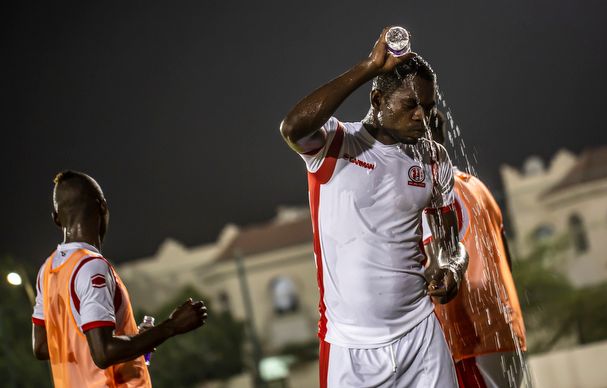
With sky-high temperatures in Qatar, the site of Burundi's final pre-tournament prep, hydration is essential. The players don't mind. "Our job as a team is to concentrate on representing our country," said midfielder Gael Bigirimana. Aparna Jayakumar for ESPN
If you watch Premier League or Championship football, you know Saido Berahino. He could be, and should be, brilliant, something Mauricio Pochettino clearly believed when he tried four times to sign him for Tottenham in 2015. It was some saga, but eventually Berahino ended up at Stoke, not Spurs, and now he finds himself without a club. He was sacked in May after being convicted of an alcohol-involved violation: not his first controversy. In 2015, he was found guilty of the same offence, and the following year he served an eight-week ban after testing positive for the recreational drug MDMA, which he said came from a spiked drink.
That rap sheet might exhaust one's patience, or one might (as some fans did) see him as a brattish young footballer who has wasted his privilege. But maybe that view would be missing most of the picture.
"A lot of people don't really know who I am in England and it'll probably put me in a different light," Berahino reflects on his status, conferred a week previously by Niyungeko, as Burundi captain.
Seeing Berahino around Burundi's team hotel in Doha invariably brings a smile. He's full of cheerful conversation and offers of help: "Do you want me to get any more of the lads here to speak to you? Is there anything you'd like from me today?" He is his country's biggest sporting star now, but nobody would envy his path here.
In 1997, his father was killed during the turmoil in Bujumbura; in 2003 he moved to England, arriving shortly after his mother and leaving his 10-year-old life behind. He experienced things no child should, and it's striking to think that, at just 25 years old, those memories are still fresh. His football talent gave him a clean start, and until last year, he'd been reluctant to commit his international future to Burundi, particularly as he had featured heavily in England's youth teams from Under-16 to Under-21 levels.
"Football-wise I had a lot of maturing to do and work to be done before coming to play for Burundi," he says. "I needed to grow as a player first before actually making the decision. I felt, at this stage of the career, that I could take on the challenge. I've been in the game a few years now so I know how to handle myself and handle expectations."
There was still little that Berahino could do to prepare for the excited crowds that greeted him on his return last summer. It was his first visit since leaving for England 15 years earlier and he wanted to reacquaint himself properly before those whistle-stop footballing trips that barely extend beyond the hotel and stadium. He felt like "a bit of a stranger" upon visiting his old neighbourhood at first but soon found the memories pouring back, his mother's friends sitting him down and regaling him with tales from his childhood. He knew he had made the right choice and felt ready to take the job of footballer-ambassador for a country whose troubles are far from over.
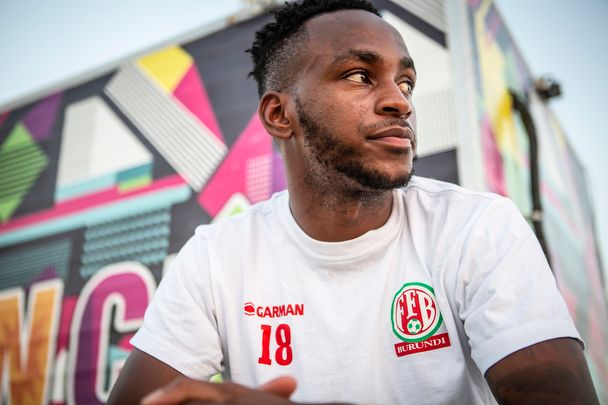
Saido Berahino is the most recognizable member of Burundi's squad given his Premier League spell. He has a new sense of maturity as their captain. "Every second, whatever I do, there are eyes on me and it matters. So I've got to stay on top of my game." Aparna Jayakumar for ESPN
Berahino made his national team debut in Gabon, where Burundi played the second of their six Cup of Nations qualifiers. He was apprehensive about how he'd be welcomed into an established squad that was shy of big names, making a "thank you" speech for the warm reception he was given before the game. "I want to let you guys carry on doing your thing," he stressed to his new teammates. "Show me the way because I'm new here, I don't yet know the philosophy of this team, I want to learn." He scored in a surprise 1-1 draw and, from that moment, Burundi's players sensed they had the chance to make history.
Mali, another side full of experience in Europe's toughest leagues, were up next and The Swallows held them to draws both home and away. South Sudan were beaten 5-2, Berahino among the scorers, and it meant a point at home to Gabon, led by Arsenal's all-action Pierre-Emerick Aubameyang, in March would be enough to qualify. They did it, despite a Gabon equaliser cancelling out Cedric Amissi's volley and making for an agonising final 10 minutes.
"Those last few minutes felt so crazy," Berahino says. "But as soon as that whistle blew, you could see the joy everyone had. The whole country was just going crazy and I don't think anybody went to work for the next two days."
It is Burundi's time and Berahino hopes that, after all the mistakes and the bad press, it can still be his too. "If this role does not give me more discipline, then I don't know what ever will," he says. "I believe this will keep me humble and disciplined. I'm leading by example now; everything matters now. Every second, whatever I do, there are eyes on me and it matters. So I've got to stay on top of my game."
He makes his way back through the hotel lobby, departing with another promise of assistance. "We just want every other person to experience what Burundi's about. We have no barriers. There's nothing we are hiding here, nothing we are ashamed of.
"We're a welcoming culture, but unfortunately we're sometimes painted in a different light."
Burundi's players huddle up during a practice in Doha. Heavy on their minds is the death of teammate Papy Faty, in April. ""He was humble to everyone, joked with everyone but was serious with his job. What can we do? We just pray for him." Aparna Jayakumar for ESPN
If Berahino and his teammates are desperate to transform their country's image, the scale of their fight is made clear by events back home. The war officially ended in 2005 but further civil unrest has been rife since 2015. The country's serving president, Pierre Nkurunziza, is an extraordinary but deeply divisive figure who can often be seen playing football on his own pitch beside Lake Tanganyika and turns out for the touring veterans' team he founded, Haleluya FC. But his decision to run for a third term four years ago led to protests and violence amid accusations that he'd violated the peace deal that ended the war.
The conflict sparked another refugee crisis; by the end of last year, more than 390,000 had fled the country according to the United Nations while more than three million Burundians are in need of humanitarian aid. The UN accept that the security situation has improved now even if the political strife remains unresolved, and the atmosphere on the ground is largely calm. The picture seen by the outside world, though, is unremittingly bleak. Burundi ranks 185th in the UN's Human Development Index, with only four countries below them. In 2018, the World Happiness Report ranked Burundi 156th of 156 surveyed nations; this year it has climbed 11 places but it is asking a lot of Burundi's footballers to change its prospects single-handedly.
"What the team has done now has revived something," says Bigirimana, the former Coventry and Newcastle midfielder. He also arrived in England as a refugee; he was 11 and made it a year after Berahino. Since pledging his own commitment to his homeland, he has exerted an equally weighty influence. "It will continue to do that. Everybody knows the nation has been in turmoil at times. What's been in the past is what it is. I think there's always something that happens in a nation where you start seeing a light at the end of the tunnel. This nation, including the national team, has been in that tunnel of darkness. And I think many people don't understand until something happens that makes that light visible. I think our national team has done that and will do that.
"It'll make people come and find out what Burundi is, not to only hear Burundi by other people's points of view. It's not perfect but it's not what it used to be, thank God. Our job as a team is to concentrate on representing our country, representing a message that we are one people, one nation."
It is a refrain that echoes throughout the squad, including players like the affable centre-back Frederic Nsabiyumva, who used to be a ballboy at the national team's Prince Louis Rwagasore Stadium. Nsabiyumva remembers watching a Cup of Nations -- he says he thinks perhaps the 2010 edition -- at home with his brothers and telling them, "My football career won't end before I've played at AFCON." They laughed, but now he tells them, "Dream big, believe in yourself, everything is possible in this world."
This message is intended for youngsters back home, of course, but for some it might already be too late. An enthusiastic bunch of Qatar-based Burundians, whose numbers swell to 30 by the midway point in the training camp, descend on the pitch every evening to watch the squad practice and prepare. One of them, a neat young man named Moussa, tells his story. Eight months ago, he paid a third party $2,000 for a plane ticket to Doha, a visa and guaranteed employment, with regular hours and accommodations. He gave up everything, flying out from Bujumbura in the hopes of a more stable life, and was left crestfallen.
His job, as a cleaner in a luxury hotel, pays $330 a month when he had been promised almost three times that. He works 11 hours a day before going back to a box of a room for which he must pay rent and where, along with nine others, he's expected to live and sleep. He would return to his homeland tomorrow if he could, but the fee he paid last year burned a hole he cannot fill. Moussa is trapped for the foreseeable future in what, to him, is a hostile, sweltering hell. It is sadly a modern African parable and a reminder that, at least where their own generation is concerned, the footballers whose skills he lauds will always be the lucky ones.
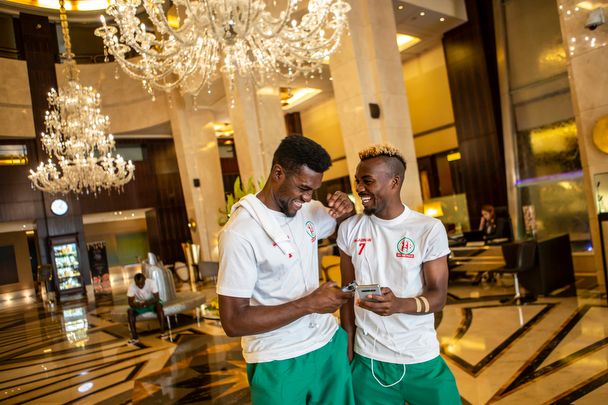
Despite the pressure Burundi's players feel to meet the expectations of the people back home, they find time to laugh and joke on their phones during a break from training in Qatar. Aparna Jayakumar for ESPN
Niyungeko must cut his squad down to the final 23 within days and, as a result, every training session is fiercely competitive. Joel Bembo-Leta, a surprise call-up who has spent his career at minor English and Welsh clubs, suffers a fever one night after arriving in Qatar but drags himself out to play, sweating, afraid of letting slip a chance that might not come again. Enock Sabumukama, a cherubic Zambia-based midfielder who is being tried out as a solution to Burundi's problem left-back position, allows himself a clenched fist after one smart overlap ends with an arrowed finish into the far corner. Back at the hotel, the atmosphere is vibrant, but here, on these Doha pitches, every movement has consequences.
One player who barely wastes a touch is Elvis Kamsoba. At 5-foot-5, the winger might easily be missed but not here, and certainly not for his club side Melbourne Victory since he joined them in January. He has quickly become a revelation in Australia's top flight and now, despite suggestions of interest from the Socceroos, he's trying out for the country of his birth. Even by the standards of his new teammates, his background has been challenging.
"If you went to where I came from just for one day, you'd come back a different man," Kamsoba says.
That used to be Kamsoba's retort on the occasions when, after moving to South Australia at age 12, racist abuse was hurled his way. Kamsoba was raised in the Nduta refugee camp, a vast settlement of displaced Burundians in northwest Tanzania. In his soft Australian accent, the 22-year-old Kamsoba recounts how his parents left Burundi when he was just four months old once the war struck their hometown of Makamba, just across the border. Life was a battle and often grim, but he knew nothing else.
"You kind of got used to everything," he says. "What's there to be afraid of? You're living to survive, pretty much. We used to get food from UNICEF every fortnight so things were OK, but not perfect. The houses were terrible and you'd make your own out of mud. There was no light and you hardly saw a car except the occasional police car or ambulance."
His contact with football, usually chaotic kick-arounds involving 50 children and one ball, honed his quick feet and close control. The population lived in alphabetically named blocks that would organise tournaments against one another, and he would join huge crowds to watch XIs from Nduta take on teams from a nearby camp of Congolese refugees. Before his family were finally approved for relocation to Australia, he'd only ever watched one professional game: France vs. Brazil in the 2006 World Cup, his dad clutching his hand tightly inside a crowded, makeshift cinema where he would usually watch Jackie Chan movies.
"If you saw how it is there, then you wouldn't say anything [offensive] to anyone," he says. "You'd be humble and praise the Lord that you can drink water and have your daily bread."
Despite a grueling schedule, the squad has time to relax on Doha's beaches. Said Berahino of his squad, "We just want every person to experience what Burundi's about. We're a welcoming culture." Aparna Jayakumar for ESPN
Until three years ago, Kamsoba would play for "Burundi South Australia," an informal team of local Burundians who competed in a mini Cup of Nations staged in Adelaide. He says he hopes his example will persuade other footballers from the diaspora to commit to Burundi and push the team on.
"That was the biggest aim for me in coming here, to lift us up as a national team and also as a country," he says. "Some kids might be afraid to return because of the history, but if we come now and tell them a different story, we can change that. We want to make them feel, 'It's OK to go home, it's safe, so if you have the talent then don't hesitate.'"
Kamsoba makes Niyungeko's 23-man cut; that hardly seemed in doubt after five minutes of watching his darting, slick, crisp play. It is rarely spoken explicitly, at least not outside the prayers Burundi's players offer in a circle before and after training, but the squad had already been depleted by one key figure before they arrived in Qatar to prepare for the Africa Cup of Nations.
Two months ago Papy Faty, a 28-year-old midfielder who had been integral to the team's qualifying campaign, collapsed and died while playing for his club side in Eswatini (formerly Swaziland). It was an awful, devastating blow; the only course of action available to those mourning him has been to package the grief into extra motivation to succeed for him, too. "He was really important to this team, such a good guy to everyone, a really close man to me," says Ndikumana, who roomed with Faty at different points in their careers. "He was humble to everyone, joked with everyone but was serious with his job. What can we do? We just pray for him. That's all I can say."
It is still raw, still almost too difficult. And it seems especially cruel that tragedy, in yet another form, has haunted this team at its brightest hour.
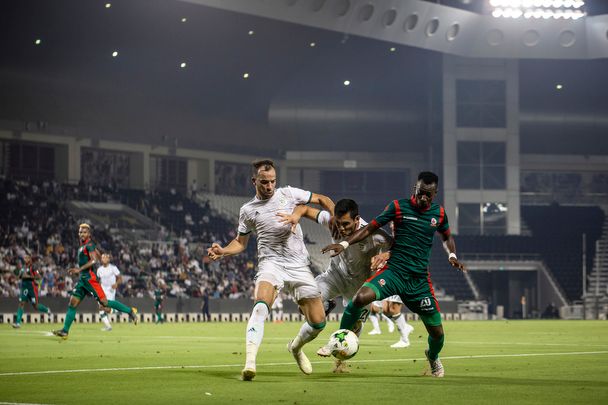
Despite being rank outsiders for the Africa Nations Cup, Burundi are in confident form. They recently held fancied Algeria to a 1-1 draw in Doha as part of their warm-up schedule. Aparna Jayakumar for ESPN
While Burundi was at war and its senior team effectively dormant, its youth side finished runners-up at the African Youth Championship in 1995 and qualified for FIFA's global equivalent, coincidentally held in Qatar, later that year. Niyungeko, a bruising striker, played in the former as they shocked Egypt, but was too old when the latter came around.
"Finally, I'll make a football career!" he told himself after receiving an offer to play in South Africa, but his mother dissuaded him and he continued studying for a degree in the humanities. On the side, he pored over the art of coaching. He met expat Germans who convinced him that if Burundians could add defensive structure to their technical quality, they could one day be formidable. "This organisation did not exist in my country," Niyungeko says. "I tried to take it seriously, because I knew the problem we have in Burundi is not about playing football. We can do that, we can play, but now I understand that we have to insist on this defensive organisation."
It became an obsession throughout a career that began with assistant roles for the national team and a stint with local club Atletico Olympic and then, upon returning from three years in the reindeer-filled wilderness of Gällivare, resumed near rock bottom with smaller sides. By 2016, the promise he made in Sweden had come true: through sheer diligence he had made his way to his country's pinnacle, becoming coach of Intamba Mu Rugamba.
"I couldn't come to Doha as a player, but I got here as a coach," he says. "I've been almost everywhere to see what I can bring my country so that we too can compete at the level of Africa's other big teams. Everybody underestimated me, but now we see with the work we've done what we can achieve something."
They have done it on a shoestring budget, too. Burundi are officially "guests" of Qatar during their pre-tournament camp but the extra, unexpected costs are difficult to bear. The team's management ponder a conditioning session at the famous Aspire Academy but decide fees of around $140 per player cannot be justified.
Back home, a focused fundraising campaign is taking place to give Intamba the best chance of competing with their more storied rivals, and their resources, in Egypt this summer. By the end of May, a collective of local companies have raised $104,000; shortly after that, the president of the national assembly hands over a cheque for $8,000 and news trickles through a week before the Africa Cup of Nations that five more firms have raised $21,000. It is the hard way, but not the only way, to help Burundi's tale of hope and regeneration make waves across the world.
"We have to work and use our patriotic spirit," Niyungeko says. "Because I know there are people who have money, who have everything, but they do not have the atmosphere we have. They do not have this love of their country, of their homeland.
"You have to love, first, and then things will come."

